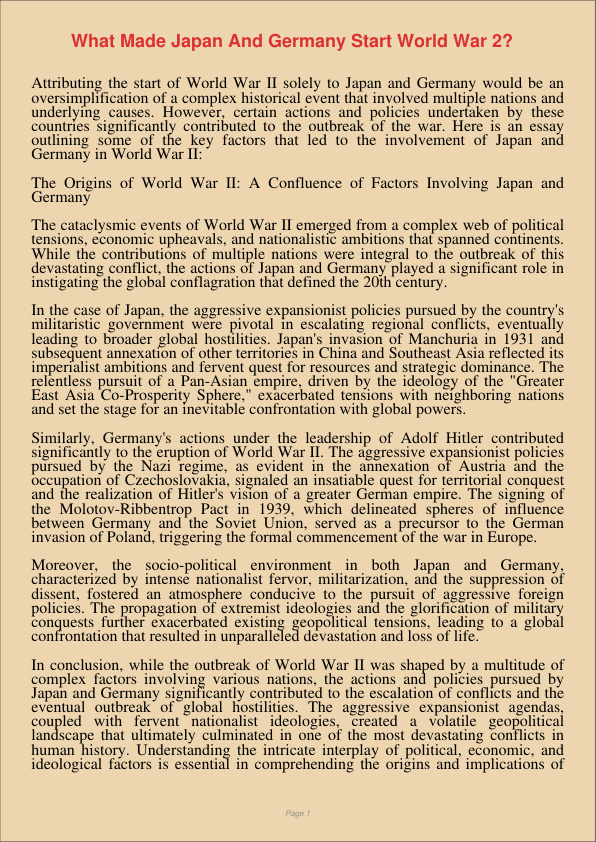
Attributing the start of World War II solely to Japan and Germany would be an oversimplification of a complex historical event that involved multiple nations and underlying causes. However, certain actions and policies undertaken by these countries significantly contributed to the outbreak of the war. Here is an essay outlining some of the key factors that led to the involvement of Japan and Germany in World War II:
The Origins of World War II: A Confluence of Factors Involving Japan and Germany
The cataclysmic events of World War II emerged from a complex web of political tensions, economic upheavals, and nationalistic ambitions that spanned continents. While the contributions of multiple nations were integral to the outbreak of this devastating conflict, the actions of Japan and Germany played a significant role in instigating the global conflagration that defined the 20th century.
In the case of Japan, the aggressive expansionist policies pursued by the country’s militaristic government were pivotal in escalating regional conflicts, eventually leading to broader global hostilities. Japan’s invasion of Manchuria in 1931 and subsequent annexation of other territories in China and Southeast Asia reflected its imperialist ambitions and fervent quest for resources and strategic dominance. The relentless pursuit of a Pan-Asian empire, driven by the ideology of the “Greater East Asia Co-Prosperity Sphere,” exacerbated tensions with neighboring nations and set the stage for an inevitable confrontation with global powers.
Similarly, Germany’s actions under the leadership of Adolf Hitler contributed significantly to the eruption of World War II. The aggressive expansionist policies pursued by the Nazi regime, as evident in the annexation of Austria and the occupation of Czechoslovakia, signaled an insatiable quest for territorial conquest and the realization of Hitler’s vision of a greater German empire. The signing of the Molotov-Ribbentrop Pact in 1939, which delineated spheres of influence between Germany and the Soviet Union, served as a precursor to the German invasion of Poland, triggering the formal commencement of the war in Europe.
Moreover, the socio-political environment in both Japan and Germany, characterized by intense nationalist fervor, militarization, and the suppression of dissent, fostered an atmosphere conducive to the pursuit of aggressive foreign policies. The propagation of extremist ideologies and the glorification of military conquests further exacerbated existing geopolitical tensions, leading to a global confrontation that resulted in unparalleled devastation and loss of life.
In conclusion, while the outbreak of World War II was shaped by a multitude of complex factors involving various nations, the actions and policies pursued by Japan and Germany significantly contributed to the escalation of conflicts and the eventual outbreak of global hostilities. The aggressive expansionist agendas, coupled with fervent nationalist ideologies, created a volatile geopolitical landscape that ultimately culminated in one of the most devastating conflicts in human history. Understanding the intricate interplay of political, economic, and ideological factors is essential in comprehending the origins and implications of World War II and serves as a poignant reminder of the catastrophic consequences of unchecked aggression and totalitarianism.
「真诚赞赏,手留余香」
真诚赞赏,手留余香
使用微信扫描二维码完成支付
